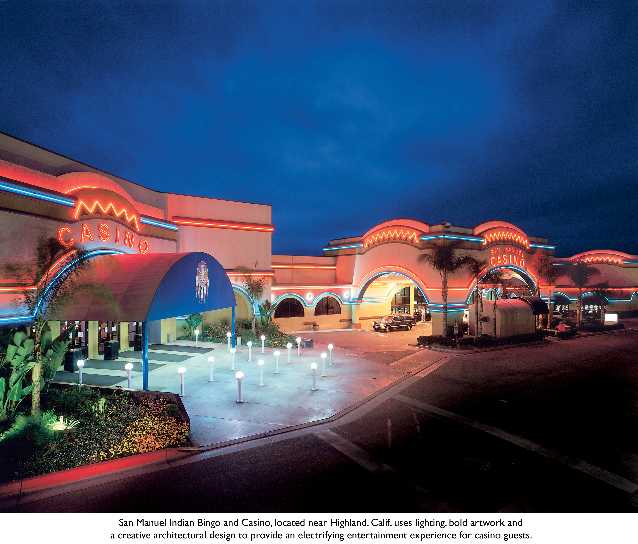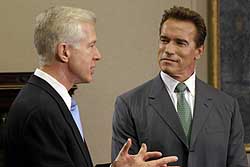 Another Stereotype of the Month entry:
Another Stereotype of the Month entry:
 Another Stereotype of the Month entry:
Another Stereotype of the Month entry:
Opinion: Columns
Last modified Tuesday, November 18, 2003 9:24 PM PST
Indian gambling must be reformed
By: DAVE COLWELL -- For the North County Times
Indian tribes maintain that state laws on the environment, political contributions and other matters do not apply on reservations. One tribe, after contracting with architects to design a casino near Sacramento, canceled the contract halfway through the work and refused to pay for services rendered. A judge found that "in a very real sense, the tribe was taking a position that it is above the law in trying to invoke sovereign immunity."
The Constitution gives Congress the power to regulate commerce with Indians and the president the right to make treaties with tribes. Chief Justice John Marshall in 1831 declared Indian tribes "domestic, dependent nations." Legislation in 1871 terminated treaty-making with the tribes, stating, "no Indian nation or tribe shall be acknowledged or recognized as an independent nation, tribe, or power."
A 1973 federal court decision declared, "An Indian tribe is sovereign to the extent that the United States permits it to be sovereign —— neither more nor less."
Today the relationship between the federal government and Indian tribes is a hodgepodge of laws and regulations creating autonomy for Indians in many areas.
An Indian at a recent powwow on the Morongo Reservation declared, "Money talks." He continued, "We have money and power, and power is what it's all about."
Money talks in Sacramento. Indian tribes donated more than $11 million during the recall campaign. Most went to Lt. Gov. Cruz Bustamante, whose brother manages an Indian casino. Other donations went to then-Gov. Gray Davis and state Sen. Tom McClintock. Of course, that money talked. Davis tried to pack the Indian gambling commission and fire its general counsel.
California's Indian gambling revenue is larger than New Jersey's and half the size of Nevada's. Nevada slot machines pay out 90 cents on the dollar, New Jersey's up to 92 cents. California's Indian slot machines pay as little as 70 cents on the dollar and provide most of the tribes' growing $5 billion revenue.
Lightly regulated businesses generating large sums can attract organized crime, money-laundering and drugs. Other states established powerful independent regulatory boards to oversee gambling. New Jersey law prohibits political donations by gambling interests.
There is no body in California with legal power to investigate the ownership, management and operation of Indian gambling casinos.
The tribes' goal is to acquire property in or near major cities, incorporate it into their reservations and bring casino gambling to every California city. Some tribal members have warned of a backlash if Indians overplay their hand. In 2000 an Indian gambling amendment to the state constitution, giving the tribes a monopoly on Las Vegas-style casino gambling in California, won 68 percent support.
All Americans who have studied the treatment of Indians after the arrival of Europeans should be ashamed. Decimation from European-induced disease, massacres, theft of Indian land and forced removals from homes are a shameful blot on our history. Most Americans have no quarrel with the legal framework that governs Indians' rights today, but leaving a multibillion-dollar casino gambling industry virtually unregulated is a mockery of governance.
The right of California's Indians to establish reservation casinos is part of the state constitution and should not be changed. For good or for ill, California already is another Nevada. One way or another, casino gambling will grow here. It would be far better to amend the state constitution and legalize off-reservation casino gambling under strict regulatory controls such as exist in other states. The state then could control the growth of the off-reservation gambling industry while leaving Indian casino gambling on the reservations.
David G. Colwell of Fallbrook is retired.

Rob's reply
>> Indian tribes donated more than $11 million during the recall campaign. Most went to Lt. Gov. Cruz Bustamante, whose brother manages an Indian casino. Other donations went to then-Gov. Gray Davis and state Sen. Tom McClintock. Of course, that money talked. <<
"Money talks"...but the Indians' money failed to reelect Gray Davis, to elect Cruz Bustamante or Tom McClintock, or to halt Arnold Schwarzenegger anti-Indian campaign. If the recall was an example of Indians' power, I'd hate to see how a group without power would fare.
>> California's Indian slot machines pay as little as 70 cents on the dollar and provide most of the tribes' growing $5 billion revenue. <<
The 70-cents figure is sheer speculation, since tribes don't have to reveal their payout rates. If it were true, customers would quickly realize it and go somewhere else.
>> Lightly regulated businesses generating large sums can attract organized crime, money-laundering and drugs. <<
Note that Colwell offers no specifics to this claim, probably because there aren't any. In fact, Indian casinos are more than lightly regulated and they haven't attracted organized crime, money-laundering, or drugs.
>> There is no body in California with legal power to investigate the ownership, management and operation of Indian gambling casinos. <<
I doubt such an investigative body exists in any state with Indian gaming. Why not? Because it would violate Indian sovereignty.
Colwell implies New Jersey has established strong controls, but they're for Atlantic City's casinos. New Jersey doesn't have any Indian casinos, so it doesn't have strong controls that apply to Indians. That makes New Jersey's situation irrelevant to California.
>> The tribes' goal is to acquire property in or near major cities, incorporate it into their reservations and bring casino gambling to every California city. <<
Wrong. California's gaming tribes don't have a single goal because they're not a single body. That may be the goal of a few tribes, but California has more than 100 tribes, and only half have any gaming at all. Colwell's statement is a gross stereotype.
>> All Americans who have studied the treatment of Indians after the arrival of Europeans should be ashamed. Decimation from European-induced disease, massacres, theft of Indian land and forced removals from homes are a shameful blot on our history. <<
That much is true.
Colwell says "Indian gambling must be reformed," but he doesn't identify a single specific problem. Apparently his newspaper has nothing better to do than jump on the Indian-bashing bandwagon.
Related links
Too-powerful Indians
The facts about Indian gaming
|
. . . |

|
All material © copyright its original owners, except where noted.
Original text and pictures © copyright 2007 by Robert Schmidt.
Copyrighted material is posted under the Fair Use provision of the Copyright Act,
which allows copying for nonprofit educational uses including criticism and commentary.
Comments sent to the publisher become the property of Blue Corn Comics
and may be used in other postings without permission.